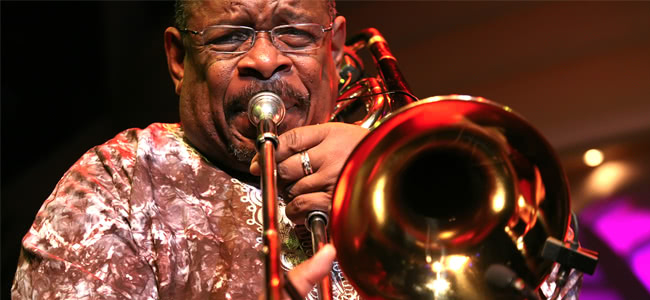James Brown may have been the Godfather of Soul, but many say it was a man called Fred Wesley who was instrumental in developing Brown’s signature sound. And it was this man, one of the most important musicians in soul music history, who took to the stage at The Corner Hotel last Sunday night.
Wesley, an American jazz and funk trombonist, was in town with his band, the new JBs, for a Bluefest sideshow.
Opening for the veteran was 10-piece funk orchestra, The Cactus Channel. Straight out of high school, the young Melburnians also list James Brown as a major influence in their music, and their upbeat mix of soul, funk and jazz was clear evidence of this.
Bass guitarist Henry Jenkins was the spokesman for the band, approaching the microphone at the front of the stage to make announcements and introductions, before retreating back to be in line with fellow band members. “We’re going to play a few tracks from the new album,” he said, “We hope you dig it.”
The choice of musical style is an unusual one for such a young group of musicians, but these teenagers display a talent and cohesiveness beyond their years. Their instrumental tracks have a strong 70s influence, and the youngsters have stamped these with their own contemporary spin, making this genre their own.
Their songs are dramatic and theatrical, and despite the absence of vocals, have a great storytelling quality. They are akin to something that would be heard in a film score, perhaps even a James Bond movie.
Short, sharp notes from the brass quintet and funky syncopated melodies punctuate the great electric guitar riffs and steady driving rhythms; theirs is music you can dance to, and was the perfect prelude to a set from one of the fathers of funk.
When the red velvet curtains reopened, they revealed Fred Wesley, seated at the front of the stage, trombone in hand. Here was the man who was music director, arranger, trombonist and primary composer for James Brown from 1968-1975, playing to the small Melbourne crowd. It was surreal.
Beginning his set with a slow, melodic trombone solo, Wesley was met with excited yelps from the eclectic audience. His set started slowly; the eight-piece band performing vintage jazz tunes as the crowd bopped their heads and shuffled from side to side.
Soon after, Wesley stood from his swivel chair and became visibly excited as he gestured to an old mate in the crowd. A hunchbacked, white haired man hobbled up on stage and greeted Wesley with open arms.
This old mate was none other than Gil Askey, a jazz trumpeter from Austin, Texas; a contemporary of jazz greats such as Dizzy Gillespie, Miles Davis and Duke Ellington. The 88-year-old, who now calls Melbourne home, grabbed a trumpet with great enthusiasm and performed an impromptu solo to the ecstatic crowd.
“Hey baby, it’s good to be here,” sang Askey, as he launched into some crazy scatting and vocal improvisation. It was just the kickstart the band needed!
After a fairly mellow beginning, Wesley addressed the crowd. “Some people ask me,” he said, in his thick southern accent, “’why do I play so much jazz?’ sometimes you need some funk. So, here’s some funk fo’ yo’ ass.”
With this, Wesley launched into a mix of songs from his enormous back catalogue, covering those from his James Brown days, his stint with the Horny Horns, and from his solo career.
It was funk at its finest – strong rhythmic grooves, melodic bass lines, intense guitar riffs and a drumbeat that will keep you dancing all night. This is what punters had come to see!
The first vocals of the night came with a rendition of Earl King’s “Trick Bag”, a song about a girl that “everyone has had,” while “Peace Power” showcased a great, funky, thick bass line with suburb trombone and keyboard solos.
Crowd participation was at a high with “Doing It To Death”, and by the end of the song, Wesley had the whole room singing along.
“House Party”, the title track off the first album Wesley released under his own name, turned the room into a hub of moving bodies. Gospel style chants volleyed back and forth from the band to the audience; and looking across the room, all hands were in the air.
The banter on stage and the laid back manner of the musicians made for a theatrical and fun performance.
The legend of funk, who will be 70 this year, promised the crowd they were “gonna have a funky good time” – and he delivered.

































